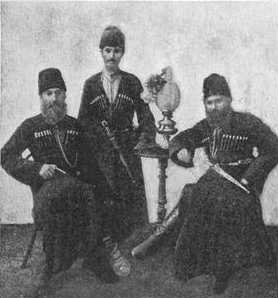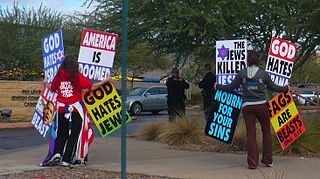Related Research Articles
Antisemitism is hostility to, prejudice towards, or discrimination against Jews. This sentiment is a form of racism, and a person who harbours it is called an antisemite. Though antisemitism is overwhelmingly perpetrated by non-Jews, it may also be perpetrated by self-hating Jews. Primarily, antisemitic tendencies may be motivated by negative sentiment towards Jews as a people or by negative sentiment towards Jews with regard to Judaism. In the former case, usually presented as racial antisemitism, a person's hostility is driven by the belief that Jews constitute a distinct race with inherent traits or characteristics that are repulsive or inferior to the preferred traits or characteristics within that person's society. In the latter case, known as religious antisemitism, a person's hostility is driven by their religion's perception of Jews and Judaism, typically encompassing doctrines of supersession that expect or demand Jews to turn away from Judaism and submit to the religion presenting itself as Judaism's successor faith—this is a common theme within the other Abrahamic religions. The development of racial and religious antisemitism has historically been encouraged by the concept of anti-Judaism, which is distinct from antisemitism itself.

The history of the Jews in Russia and areas historically connected with it goes back at least 1,500 years. Jews in Russia have historically constituted a large religious and ethnic diaspora; the Russian Empire at one time hosted the largest population of Jews in the world. Within these territories, the primarily Ashkenazi Jewish communities of many different areas flourished and developed many of modern Judaism's most distinctive theological and cultural traditions, while also facing periods of antisemitic discriminatory policies and persecution, including violent pogroms. Some have described a "renaissance" in the Jewish community inside Russia since the beginning of the 21st century; however, the Russian Jewish population has experienced precipitous decline since the dissolution of the USSR which continues to this day, although it is still among the largest in Europe.

The history of the Jews in the Soviet Union is inextricably linked to much earlier expansionist policies of the Russian Empire conquering and ruling the eastern half of the European continent already before the Bolshevik Revolution of 1917. "For two centuries – wrote Zvi Gitelman – millions of Jews had lived under one entity, the Russian Empire and [its successor state] the USSR. They had now come under the jurisdiction of fifteen states, some of which had never existed and others that had passed out of existence in 1939." Before the revolutions of 1989 which resulted in the end of communist rule in Central and Eastern Europe, a number of these now sovereign countries constituted the component republics of the Soviet Union.
The American Jewish Committee (AJC) is a Jewish advocacy group established on November 11, 1906. It is one of the oldest Jewish advocacy organizations and, according to The New York Times, is "widely regarded as the dean of American Jewish organizations". As of 2009, AJC envisions itself as the "Global Center for Jewish and Israel Advocacy".
Union of Councils for Jews in the Former Soviet Union (UCSJ) is a non-governmental organization that reports on the human rights conditions in countries throughout Eastern Europe and Central Asia, exposing hate crimes and assisting communities in need. UCSJ uses grassroots-based monitoring and advocacy, as well as humanitarian aid, to protect the political and physical safety of Jewish people and other minorities in the region. UCSJ is based in Washington, D.C., and is linked to other organizations such as the Moscow Helsinki Group. It has offices in Russia and Ukraine and has a collegial relationship with human rights groups that were founded by the UCSJ in the countries of the former Soviet Union.
Żydokomuna is an anti-communist and antisemitic canard, or a pejorative stereotype, suggesting that most Jews collaborated with the Soviet Union in importing communism into Poland, or that there was an exclusively Jewish conspiracy to do so. A Polish language term for "Jewish Bolshevism", or more literally "Jewish communism", Żydokomuna is related to the "Jewish world conspiracy" myth.

The history of the Jews in Ukraine dates back over a thousand years; Jewish communities have existed in the modern territory of Ukraine from the time of the Kievan Rus'. Important Jewish religious and cultural movements, from Hasidism to Zionism, arose there. According to the World Jewish Congress, the Jewish community in Ukraine constitutes Europe's third-largest and the world's fifth-largest.

The history of the Jews in Belarus begins as early as the 8th century. Jews lived in all parts of the lands of modern Belarus. In 1897, the Jewish population of Belarus reached 910,900, or 14.2% of the total population. Following the Polish-Soviet War (1919-1920), under the terms of the Treaty of Riga, Belarus was split into Eastern Belorussia and Western Belorussia, and causing 350,000-450,000 of the Jews to be governed by Poland. Prior to World War II, Jews were the third largest ethnic group in Belarus and comprised more than 40% of the urban population. The population of cities such as Minsk, Pinsk, Mahiliou, Babrujsk, Viciebsk, and Homiel was more than 50% Jewish. In 1926 and 1939 there were between 375,000 and 407,000 Jews in Belarus or 6.7-8.2% of the total population. Following the Soviet annexation of Eastern Poland in 1939, including Western Belorussia, Belarus would again have 1,175,000 Jews within its borders, including 275,000 Jews from Poland, Ukraine, and elsewhere. It is estimated 800,000 of 900,000 — 90% of the Jews of Belarus —were killed during the Holocaust. According to the 2019 Belarusian census, there were 13,705 self-identifying Jews in Belarus, of which most are of Ashkenazi origin. However, the Israeli embassy in Belarus claims to know about 30-50 thousand Belarusians with Jewish descent.
Antisemitism in universities has taken place in many countries at various times. Antisemitism has been manifested in various policies and practices, such as restricting the admission of Jewish students by a Jewish quota, or ostracism, intimidation, or violence against Jewish students, as well as in the hiring, retention and treatment of Jewish staff. In some instances, universities have supported antisemitic government or social policies and condoned the development of antisemitic cultures on campus.

The history of the Jews in Azerbaijan dates back many centuries. Today, Jews in Azerbaijan mainly consist of three distinct groups: Mountain Jews, the most sizable and most ancient group; Ashkenazi Jews, who settled in the area during the late 19th-early 20th centuries, and during World War II; and Georgian Jews who settled mainly in Baku during the early part of the 20th century.

Different opinions exist among historians regarding the extent of antisemitism in American history and how American antisemitism contrasted with its European counterpart. In contrast to the horrors of European history, John Higham states that in the United States "no decisive event, no deep crisis, no powerful social movement, no great individual is associated primarily with, or significant chiefly because of anti-Semitism." Accordingly, David A. Gerber concludes that antisemitism "has been a distinctly minor feature of the nation's historical development." On the other hand, no period of Jewish history in the United States was completely free from antisemitism.

Antisemitism has long existed in the United States. Most Jewish community relations agencies in the United States draw distinctions between antisemitism, which is measured in terms of attitudes and behaviors, and the security and status of American Jews, which are both measured by the occurrence of specific incidents.
The anti-Jewish violence in Central and Eastern Europe following the retreat of Nazi German occupational forces and the arrival of the Soviet Red Army – during the latter stages of World War II – was linked in part to postwar anarchy and economic chaos exacerbated by the Stalinist policies imposed across the territories of expanded Soviet republics and new satellite countries. The anti-semitic attacks had become frequent in Soviet towns ravaged by war; at the marketplaces, in depleted stores, in schools, and even at state enterprises. Protest letters were sent to Moscow from numerous Russian, Ukrainian and Belarusian towns by the Jewish Anti-Fascist Committee involved in documenting the Holocaust.

The government of Belarus is criticized for its human rights violations and persecution of non-governmental organisations, independent journalists, national minorities, and opposition politicians. In a testimony to the United States Senate Committee on Foreign Relations, former United States Secretary of State Condoleezza Rice labeled Belarus as one of the world's six "outposts of tyranny". In response, the Belarusian government called the assessment "quite far from reality". During 2020 Belarusian presidential election and protests, the number of political prisoners recognized by Viasna Human Rights Centre rose dramatically to 1062 as of 16 February 2022. Several people died after the use of unlawful and abusive force by law enforcement officials during 2020 protests. According to Amnesty International, the authorities didn't investigate violations during protests but instead harassed those who challenged their version of events. In July 2021, the authorities launched a campaign against the remaining non-governmental organizations, liquidating at least 270 of them by October, including all previously registered human rights organizations in the country.

The Anti-Defamation League (ADL), formerly known as the Anti-Defamation League of B'nai B'rith, is a New York–based international Jewish non-governmental organization and advocacy group that specializes in civil rights law and combatting antisemitism and extremism.
Antisemitism in France has become heightened since the late 20th century and into the 21st century. In the early 21st century, most Jews in France, like most Muslims in France, are of North African origin. France has the largest population of Jews in the diaspora after the United States—an estimated 500,000–600,000 persons. Paris has the highest population, followed by Marseilles, which has 70,000 Jews. Expressions of antisemitism were seen to rise during the Six-Day War of 1967 and the French anti-Zionist campaign of the 1970s and 1980s. Following the electoral successes achieved by the extreme right-wing National Front and an increasing denial of the Holocaust among some persons in the 1990s, surveys showed an increase in stereotypical antisemitic beliefs among the general French population.

The Jewish left consists of Jews who identify with, or support, left-wing or left-liberal causes, consciously as Jews, either as individuals or through organizations. There is no one organization or movement which constitutes the Jewish left, however. Jews have been major forces in the history of the labor movement, the settlement house movement, the women's rights movement, anti-racist and anti-colonialist work, and anti-fascist and anti-capitalist organizations of many forms in Europe, the United States, Australia, Algeria, Iraq, Ethiopia, South Africa, and modern-day Israel. Jews have a history of involvement in anarchism, socialism, Marxism, and Western liberalism. Although the expression "on the left" covers a range of politics, many well-known figures "on the left" have been of Jews who were born into Jewish families and have various degrees of connection to Jewish communities, Jewish culture, Jewish tradition, or the Jewish religion in its many variants.
The working definition of antisemitism, also called the International Holocaust Remembrance Alliance definition of antisemitism or IHRA definition, is a non-legally binding statement on what antisemitism is, that reads: "Antisemitism is a certain perception of Jews, which may be expressed as hatred toward Jews. Rhetorical and physical manifestations of antisemitism are directed toward Jewish or non-Jewish individuals and/or their property, toward Jewish community institutions and religious facilities." Accompanying the working definition, but of disputed status, are 11 illustrative examples whose purpose is described as guiding the IHRA in its work, seven of which relate to criticism of the Israeli government. As such, pro-Israeli organizations have been advocates for the worldwide legal adoption of the definition.

New York City includes a sizeable Belarusian American population. The New York metropolitan area has one of the largest concentrations of Belarusians in the United States. Many Belarusians live in Brighton Beach and elsewhere in South Brooklyn, along with other ex-Soviet immigrants including Russians and Ukrainians. Around 55,000 people of Belarusian descent live in the New York City metropolitan area, with estimates ranging from 50,000 to 75,000.
Zionist antisemitism or antisemitic Zionism refers to a phenomenon in which antisemites express support for Zionism and the State of Israel. In some cases, this support may be promoted for explicitly antisemitic reasons. Historically, this type of antisemitism has been most notable among Christian Zionists, who may perpetrate religious antisemitism while being outspoken in their support for Jewish sovereignty in Israel due to their interpretation of Christian eschatology. Similarly, people who identify with the political far-right, particularly in Europe and the United States, may support the Zionist movement because they seek to expel Jews from their country and see Zionism as the least complicated method of achieving this goal and satisfying their racial antisemitism.
References
- ↑ "In Belarus, 'Europe's last dictatorship,' Jews fear police but not anti-Semitism". The Times of Israel . Retrieved 2024-02-24.
- ↑ "Belarus State-linked Media Suggests Jewish Organizations Are Disloyal". Haaretz . Retrieved 2024-02-24.
- ↑ "AJC, Dozens of Jewish Organizations Call on Tech Companies to Do More To Combat Surge in Antisemitism". American Jewish Committee . Retrieved 2024-02-24.